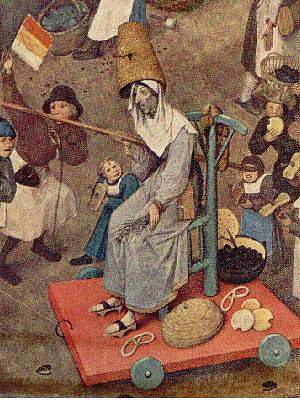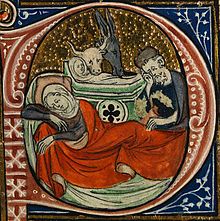
Compline is the only hour in the Benedictine (and Carthusian!) Office that remains the same every day (the Marian antiphon aside).
In the darkness
Said last thing in the evening, it is often said literally in the dark in monasteries, from memory, and thus teaches us how to deal with the darkness that inevitably surrounds us in this world, as well as the darkness and dangers of the literal night itself.
In the darkness
Said last thing in the evening, it is often said literally in the dark in monasteries, from memory, and thus teaches us how to deal with the darkness that inevitably surrounds us in this world, as well as the darkness and dangers of the literal night itself.
The structure of Compline is described in St Benedict’s Rule in Chapters 17 and 18, however it has evolved over time, with the addition at the beginning of a new ‘opening section’ that includes a short reading warning of the dangers of the night and an examination of conscience and confession of sins; at the end with a Marian antiphon and prayer.
The psalms of the hour
The three psalms set for it are Psalms 4, 90 and 133.
The psalms of the hour
The three psalms set for it are Psalms 4, 90 and 133.
Psalm 4
Like Psalm 3 that opens the day, Psalm 4 contains verses that makes it particularly appropriate to the hour, indeed one that is in effect response to the verse on rising from sleep in Psalm 3:
9 In pace in idípsum * dórmiam et requiéscam;
|
In peace in the self same I will sleep, and I will rest
|
10 Quóniam tu, dómine, singuláriter in spe * constituísti me.
|
For you, O Lord, singularly have settled me in hope.
|
The psalm calls upon us to repent of the sins of the day; asks God to grant us forgiveness and the grace to do better in future; and asks for God’s blessing on our sleep.
Psalm 90
Psalm 90 is most commonly associated with Our Lord's temptation in the desert in the Gospels, and provides reassurance of God’s protection of the just against all the dangers that can arise. The first section of the psalm sets out the promise of divine protection that God grants to the faithful. It closes with words put in the mouth of God.
One particular reason its use may have appealed to St Benedict is the allusion to God as our 'susceptor' or sustainer, upholder, a word (which also appears in Psalm 3) that was particularly important in the monastic tradition, not least for its associations with the Suscipe verse (Psalm 118:116) used in the monastic profession ceremony.
He may also have liked the symmetry involved in the seventh verses of Psalm 3 (first thing in the day) and Psalm 90, both of which refer to standing firm even though surrounded by thousands:
One particular reason its use may have appealed to St Benedict is the allusion to God as our 'susceptor' or sustainer, upholder, a word (which also appears in Psalm 3) that was particularly important in the monastic tradition, not least for its associations with the Suscipe verse (Psalm 118:116) used in the monastic profession ceremony.
He may also have liked the symmetry involved in the seventh verses of Psalm 3 (first thing in the day) and Psalm 90, both of which refer to standing firm even though surrounded by thousands:
Psalm 3:7 Non
timébo míllia pópuli circumdántis me: * exsúrge, Dómine, salvum me fac, Deus
meus.
|
I will not
fear thousands of the people, surrounding me: arise, O Lord; save me, O my
God.
|
Psalm 90:7 Cadent a látere tuo mille, et decem míllia
a dextris tuis: * ad te autem non appropinquábit.
|
A thousand shall fall at your side, and ten thousand at
your right hand: but it shall not come near you.
|
Psalm 133
The last psalm of the each day, Psalm 133 is also the last of the Gradual psalms, said in ancient times liturgically when the priests stood on the highest of the steps on the Temple, symbolising the entrant to heaven.
At the literal level, this psalm is a summons to worship at night, to give God thanks for the blessings of the day. Spiritually though, it points to our ultimate destination in heaven, where the worship of God never ends. It concludes by requesting a blessing from God on us.
At the literal level, this psalm is a summons to worship at night, to give God thanks for the blessings of the day. Spiritually though, it points to our ultimate destination in heaven, where the worship of God never ends. It concludes by requesting a blessing from God on us.
In a monastery, the hour is traditionally followed by the abbot or abbess sprinkling the monks or nuns with holy water, usually while verses of Psalm 50 (from ‘Asperges me…’) are chanted.
And then the Great Silence falls, lasting until the first words of Matins, which ask God to open our lips that we might sing his praise.
1. Verse by verse notes
Introduction to Psalm 133
Psalm 133 verse1
Psalm 133 verse 2
Psalm 133 verse 3
Psalm 133 verse 4
2. Short summaries from the Fathers and other commentators
Psalm 4
Psalm 90
Psalm 133
3. The psalms of Compline in other contexts
Psalm 4 in Tenebrae of holy Saturday
And then the Great Silence falls, lasting until the first words of Matins, which ask God to open our lips that we might sing his praise.
Posts on the psalms of Compline
1. Verse by verse notes
Introduction to Psalm 133
Psalm 133 verse1
Psalm 133 verse 2
Psalm 133 verse 3
Psalm 133 verse 4
2. Short summaries from the Fathers and other commentators
Psalm 4
Psalm 90
Psalm 133
3. The psalms of Compline in other contexts
Psalm 4 in Tenebrae of holy Saturday





